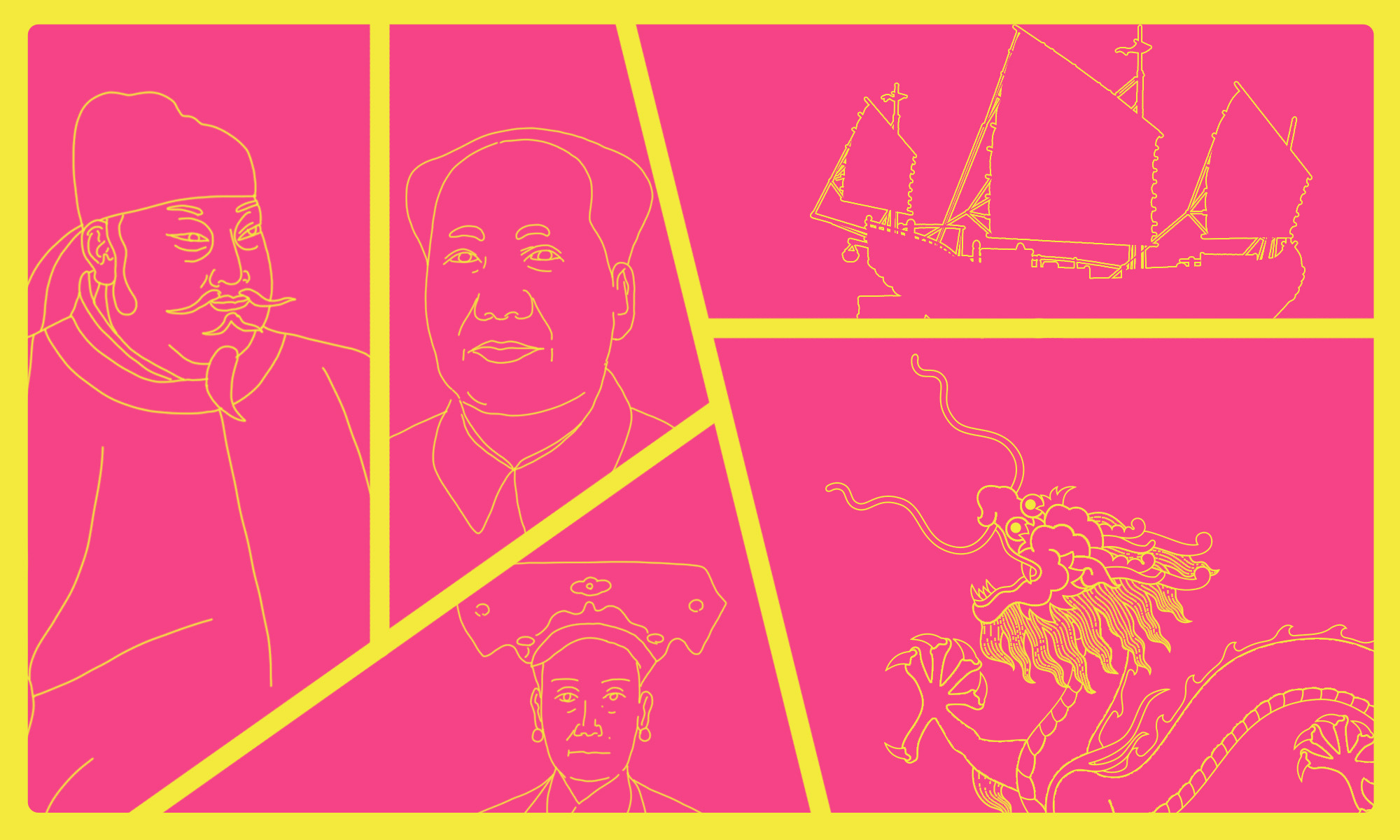In Memoriam: Jeffrey A. Bader, from February 2022
Update: 2023-10-26
Description
This week on Sinica, we're running an interview with Jeffrey Bader from early last year. We learned on Monday morning that Jeff had died, and we dedicate this interview to his memory.
___
This week on Sinica, Kaiser chats with Jeff Bader, who served as senior director for Asian affairs at the National Security Council during the first years of the Obama presidency, until 2011. Now a senior fellow at the John L. Thornton China Center at the Brookings Institute, Jeff was deeply involved in U.S.-China affairs at the State Department from his first posting to Beijing back in 1981 continuously for the next 21 years, through 2002. He later served as U.S. ambassador to Namibia and was tapped to head Asian Affairs at the NSC after Obama took office. Jeff is the author of a fascinating book on Obama’s China policy, Obama and China’s Rise: An Insider’s Account of America’s Asia Strategy. In this conversation, he offers a candid critique of the Biden China policy to date.
Note that this conversation was taped in mid-February — before the Russian invasion of Ukraine began, and before the Department of Justice announced the end of the “China Initiative.”
Note that this conversation was taped in mid-February — before the Russian invasion of Ukraine began, and before the Department of Justice announced the end of the “China Initiative.”
3:23 – How viewing China over 40 years of rapid development has shaped the way Jeff thinks about China
8:54 – Jeff Bader’s critique of the Biden administration’s China policy
19:40 – Is it important to have a China strategy?
24:55 – Right-sizing China’s ambitions: Is Rush Doshi right?
31:17 – Defining China’s legitimate interests
38:31 – Has China already concluded that the U.S., irrespective of who is in power, seeks to thwart China’s rise?
43:16 – How can China participate in the rules-based international order?
47:52 – Is it still possible for Biden to change his tune on China?
52:57 – How much room does Biden have politically? Can he exploit to electorate’s partisan divide on China?
59:54 – What is the “low-hanging fruit” that Biden could pluck to signal a lowering of temperature?
1:12:09 – Jeff Bader’s precepts for better understanding of — and better policy toward — China
Recommendations
Jeff: Autumn in the Heavenly Kingdom, a book by Stephen Platt about the Taiping Civil War focusing on Hong Rengan.
Kaiser: Re-recommending two previous guests’ recommendations: Iaian McGilchrists’s The Master and his Emissary recommended by Anthea Roberts; and Unfabling the East: The Enlightenment’s Encounter with Asia by Jurgen Osterhammel, recommended by Dan Wang.
TRANSCRIPT:
Kaiser Kuo: Welcome to the Sinica Podcast, a weekly discussion of current affairs in China, produced in partnership with The China Project. Subscribe to The China Project’s daily Access newsletter to keep on top of all the latest news from China, from hundreds of different news sources, or check out all the original writing on our website at supchina.com. We’ve got reported stories, essays, and editorials, great explainers, and trackers, regular columns, and, of course, a growing library of podcasts. We cover everything from China’s fraught foreign relations to its ingenious entrepreneurs, from the ongoing repression of Uyghurs and other Muslim peoples in China’s Xinjiang region to the tectonic shifts underway, as China rolls out what we call the Red New Deal. It’s a feast of business, political, and cultural news about a nation that is reshaping the world. We cover China with neither fear nor favor.
I’m Kaiser Kuo, coming to you from Chapel Hill, North Carolina.
It’s a rare thing that I read anything these days and find myself in emphatic agreement with every bit of it, the descriptive and prescriptive alike. But that’s how I felt about a recent piece for the Brookings website by Jeff Bader, a veteran diplomat, who was senior director for Asian Affairs at the National Security Council during the first years of the Obama presidency until 2011. Ambassador Bader served as U.S. ambassador to Namibia and is now a senior fellow at the John L. Thornton China Center at Brookings.
But he was deeply involved in the U.S.-China relationship at the State Department from his first posting to Beijing back in 1981 for the next 21 years, really through 2002, before being tapped to head Asian Affairs at NSC after Obama took office. After leaving the Obama administration, he wrote a fascinating book on Obama’s China policy, Obama and China’s Rise: An Insider’s Account of America’s Asia Strategy. The Brookings piece in question was titled “Biden’s China policy needs to be more than just Trump lite.” And in the next hour, we’ll talk about that piece and much else. Ambassador Bader, Jeff, if I may, welcome to Sinica.
Jeff Bader: Thank you, Kaiser. That’s fine, I prefer Jeff.
Kaiser: So, Jeff, I want to focus today on U.S.-China policy and specifically on your critique of the Biden administration’s policy to date. But I should note that first there’s an excellent podcast interview with you that was actually conducted by James Green, another diplomat with a lot of China experience, who runs — ran, rather — the U.S.-China dialogue podcast that went from 2019 to 2020. Yours is a two-parter. In fact, it covers a lot of ground. I highly recommend that [interview to] listeners who are interested in Jeff Bader’s storied career, his relationship with Richard Holbrooke, his experiences in China in the 1980s, and the management of the Tiananmen crisis, the participation in the WTO accession negotiations at the turn of the millennium. And, of course, his decision to back the young Illinois senator rather than the former first lady, who everyone was sure was going to win the Democratic nomination. You should check that out. It’s fantastic. Wait until we have Jeff back on Sinica and we can really do a deep dive into his career.
But I do want to point out that by coincidence, you and I actually, Jeff, we have in common the fact that our first stints in China were in the year 1981. I was just a teenager back then and only stayed for that one summer, while you were on your first extended posting to China for the State Department. How has seeing the extent of change in China and watching it unfold in person over these several decades, how has that shaped the way that you approach China, that you think about China?
Jeff: Well, I was there from 1981 to 1983 as a political officer. I was responsible for China’s internal politics, which essentially was an impossible job in those days. There was no publicly available literature beyond the People’s Daily, which had its limitations in value. Talking to people was highly risky. People didn’t want to talk to you and if they did, they were taking a risk. So the job itself had, let’s say a low ceiling in what you could accomplish. The city itself was a pretty dreary, dismal place. My main recollections are of about 4 million people in identical blue suits, riding around on bicycles in the bicycle lanes every day down the Jiànguómén Wài 建国门外 Boulevard. And a handful of cars weaving their way through. There were no restaurants, no publicly available restaurants at all. I had every meal essentially in the Peking Hotel for two years, which is a fate I wouldn’t wish on anyone.
So it was a dreary place, it was hard to understand. I remember Dèng Xiǎopíng 邓小平 saying that China planned to increase its GDP fourfold in the next, I think 20 years was his target. And that seemed impossible as one looked around at what was a state dominated, Stalinist society. You couldn’t travel anywhere. While I was there, there were about 27 cities that were opened up for travel without prior permission. And even there, you were tracked pretty closely. So when I came back from my first subsequent visit in 1987, when I was deputy director of China at State, in just four short years, I was astonished by the visual changes in the city, the dynamism, the neon lights, the restaurants, the variations in people’s dress, the opening of malls. You could see the direction China was going, it was going much, much faster than one could have imagined.
Kaiser: It’s a bit like going from black and white to color suddenly.
Jeff: Yeah, I came to Beijing from Taipei. I had been studying Chinese in Taipei. And Taipei was a modern Chinese city. It was like Hong Kong in those days. And so the shock of going from Taipei to Beijing was all the more stark because of the different levels of development and the different levels of dynamism.
Kaiser: So how has that shaped the way you think now, just seeing the rapidity of change, the sort of compressed nature of China’s development experience?
Jeff: Oh, in several respects. I mean, one is never underestimate the Chinese people. I mean, that’s my main conclusion. You had a population that had gone through 30 years of the People’s Republic of China and Maoism, essential
___
This week on Sinica, Kaiser chats with Jeff Bader, who served as senior director for Asian affairs at the National Security Council during the first years of the Obama presidency, until 2011. Now a senior fellow at the John L. Thornton China Center at the Brookings Institute, Jeff was deeply involved in U.S.-China affairs at the State Department from his first posting to Beijing back in 1981 continuously for the next 21 years, through 2002. He later served as U.S. ambassador to Namibia and was tapped to head Asian Affairs at the NSC after Obama took office. Jeff is the author of a fascinating book on Obama’s China policy, Obama and China’s Rise: An Insider’s Account of America’s Asia Strategy. In this conversation, he offers a candid critique of the Biden China policy to date.
Note that this conversation was taped in mid-February — before the Russian invasion of Ukraine began, and before the Department of Justice announced the end of the “China Initiative.”
Note that this conversation was taped in mid-February — before the Russian invasion of Ukraine began, and before the Department of Justice announced the end of the “China Initiative.”
3:23 – How viewing China over 40 years of rapid development has shaped the way Jeff thinks about China
8:54 – Jeff Bader’s critique of the Biden administration’s China policy
19:40 – Is it important to have a China strategy?
24:55 – Right-sizing China’s ambitions: Is Rush Doshi right?
31:17 – Defining China’s legitimate interests
38:31 – Has China already concluded that the U.S., irrespective of who is in power, seeks to thwart China’s rise?
43:16 – How can China participate in the rules-based international order?
47:52 – Is it still possible for Biden to change his tune on China?
52:57 – How much room does Biden have politically? Can he exploit to electorate’s partisan divide on China?
59:54 – What is the “low-hanging fruit” that Biden could pluck to signal a lowering of temperature?
1:12:09 – Jeff Bader’s precepts for better understanding of — and better policy toward — China
Recommendations
Jeff: Autumn in the Heavenly Kingdom, a book by Stephen Platt about the Taiping Civil War focusing on Hong Rengan.
Kaiser: Re-recommending two previous guests’ recommendations: Iaian McGilchrists’s The Master and his Emissary recommended by Anthea Roberts; and Unfabling the East: The Enlightenment’s Encounter with Asia by Jurgen Osterhammel, recommended by Dan Wang.
TRANSCRIPT:
Kaiser Kuo: Welcome to the Sinica Podcast, a weekly discussion of current affairs in China, produced in partnership with The China Project. Subscribe to The China Project’s daily Access newsletter to keep on top of all the latest news from China, from hundreds of different news sources, or check out all the original writing on our website at supchina.com. We’ve got reported stories, essays, and editorials, great explainers, and trackers, regular columns, and, of course, a growing library of podcasts. We cover everything from China’s fraught foreign relations to its ingenious entrepreneurs, from the ongoing repression of Uyghurs and other Muslim peoples in China’s Xinjiang region to the tectonic shifts underway, as China rolls out what we call the Red New Deal. It’s a feast of business, political, and cultural news about a nation that is reshaping the world. We cover China with neither fear nor favor.
I’m Kaiser Kuo, coming to you from Chapel Hill, North Carolina.
It’s a rare thing that I read anything these days and find myself in emphatic agreement with every bit of it, the descriptive and prescriptive alike. But that’s how I felt about a recent piece for the Brookings website by Jeff Bader, a veteran diplomat, who was senior director for Asian Affairs at the National Security Council during the first years of the Obama presidency until 2011. Ambassador Bader served as U.S. ambassador to Namibia and is now a senior fellow at the John L. Thornton China Center at Brookings.
But he was deeply involved in the U.S.-China relationship at the State Department from his first posting to Beijing back in 1981 for the next 21 years, really through 2002, before being tapped to head Asian Affairs at NSC after Obama took office. After leaving the Obama administration, he wrote a fascinating book on Obama’s China policy, Obama and China’s Rise: An Insider’s Account of America’s Asia Strategy. The Brookings piece in question was titled “Biden’s China policy needs to be more than just Trump lite.” And in the next hour, we’ll talk about that piece and much else. Ambassador Bader, Jeff, if I may, welcome to Sinica.
Jeff Bader: Thank you, Kaiser. That’s fine, I prefer Jeff.
Kaiser: So, Jeff, I want to focus today on U.S.-China policy and specifically on your critique of the Biden administration’s policy to date. But I should note that first there’s an excellent podcast interview with you that was actually conducted by James Green, another diplomat with a lot of China experience, who runs — ran, rather — the U.S.-China dialogue podcast that went from 2019 to 2020. Yours is a two-parter. In fact, it covers a lot of ground. I highly recommend that [interview to] listeners who are interested in Jeff Bader’s storied career, his relationship with Richard Holbrooke, his experiences in China in the 1980s, and the management of the Tiananmen crisis, the participation in the WTO accession negotiations at the turn of the millennium. And, of course, his decision to back the young Illinois senator rather than the former first lady, who everyone was sure was going to win the Democratic nomination. You should check that out. It’s fantastic. Wait until we have Jeff back on Sinica and we can really do a deep dive into his career.
But I do want to point out that by coincidence, you and I actually, Jeff, we have in common the fact that our first stints in China were in the year 1981. I was just a teenager back then and only stayed for that one summer, while you were on your first extended posting to China for the State Department. How has seeing the extent of change in China and watching it unfold in person over these several decades, how has that shaped the way that you approach China, that you think about China?
Jeff: Well, I was there from 1981 to 1983 as a political officer. I was responsible for China’s internal politics, which essentially was an impossible job in those days. There was no publicly available literature beyond the People’s Daily, which had its limitations in value. Talking to people was highly risky. People didn’t want to talk to you and if they did, they were taking a risk. So the job itself had, let’s say a low ceiling in what you could accomplish. The city itself was a pretty dreary, dismal place. My main recollections are of about 4 million people in identical blue suits, riding around on bicycles in the bicycle lanes every day down the Jiànguómén Wài 建国门外 Boulevard. And a handful of cars weaving their way through. There were no restaurants, no publicly available restaurants at all. I had every meal essentially in the Peking Hotel for two years, which is a fate I wouldn’t wish on anyone.
So it was a dreary place, it was hard to understand. I remember Dèng Xiǎopíng 邓小平 saying that China planned to increase its GDP fourfold in the next, I think 20 years was his target. And that seemed impossible as one looked around at what was a state dominated, Stalinist society. You couldn’t travel anywhere. While I was there, there were about 27 cities that were opened up for travel without prior permission. And even there, you were tracked pretty closely. So when I came back from my first subsequent visit in 1987, when I was deputy director of China at State, in just four short years, I was astonished by the visual changes in the city, the dynamism, the neon lights, the restaurants, the variations in people’s dress, the opening of malls. You could see the direction China was going, it was going much, much faster than one could have imagined.
Kaiser: It’s a bit like going from black and white to color suddenly.
Jeff: Yeah, I came to Beijing from Taipei. I had been studying Chinese in Taipei. And Taipei was a modern Chinese city. It was like Hong Kong in those days. And so the shock of going from Taipei to Beijing was all the more stark because of the different levels of development and the different levels of dynamism.
Kaiser: So how has that shaped the way you think now, just seeing the rapidity of change, the sort of compressed nature of China’s development experience?
Jeff: Oh, in several respects. I mean, one is never underestimate the Chinese people. I mean, that’s my main conclusion. You had a population that had gone through 30 years of the People’s Republic of China and Maoism, essential
Comments
In Channel
























